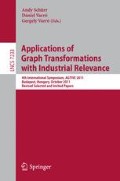Abstract
In a context where graph transformation is used to explore a space of possible solutions to a given problem, it is almost always necessary to inspect candidate solutions for relevant properties. This means that there is a need for a flexible mechanism to query not only graphs but also their evolution. In this paper we show how to use Prolog queries to analyse graph exploration. Queries can operate both on the level of individual graphs and on the level of the transformation steps, enabling a very powerful and flexible analysis method. This has been implemented in the graph-based verification tool groove. As an application of this approach, we show how it gives rise to a competitive analysis technique in the domain of feature modelling.
Access this chapter
Tax calculation will be finalised at checkout
Purchases are for personal use only
Preview
Unable to display preview. Download preview PDF.
References
Azab, K., Habel, A., Pennemann, K.H., Zuckschwerdt, C.: ENFORCe: A system for ensuring formal correctness of high-level programs. In: Zündorf, A., Varró, D. (eds.) Proc. of the 3rd Int. Workshop on Graph-Based Tools. ECEASST, vol. 1 (2007)
Baier, C., Katoen, J.P.: Principles of Model Checking. MIT Press (2008)
Balogh, Z., Varró, D.: Model transformation by example using inductive logic programming. Software and System Modeling 8(3), 347–364 (2009)
Batory, D.: Feature Models, Grammars, and Propositional Formulas. In: Obbink, H., Pohl, K. (eds.) SPLC 2005. LNCS, vol. 3714, pp. 7–20. Springer, Heidelberg (2005)
Benavides, D., Trinidad, P., Ruiz-Cortés, A.: Automated Reasoning on Feature Models. In: Pastor, Ó., Falcão e Cunha, J. (eds.) CAiSE 2005. LNCS, vol. 3520, pp. 491–503. Springer, Heidelberg (2005)
Benavides, D., Segura, S., Ruiz-Cortés, A.: Automated analysis of feature models 20 years later: A literature review. Information Systems 35, 615–636 (2010)
Clocksin, W.F., Mellish, C.S.: Programming in Prolog. Springer (1984)
Crouzen, P., van de Pol, J.C., Rensink, A.: Applying formal methods to gossiping networks with mCRL and groove. In: Haverkort, B.R.H.M., Siegle, M., van Steen, M. (eds.) ACM SIGMETRICS Performance Evaluation Review, vol. 36, pp. 7–16. ACM, New York (2008)
Czarnecki, K., Helsen, S., Eisenecker, U.: Staged Configuration Using Feature Models. In: Nord, R.L. (ed.) SPLC 2004. LNCS, vol. 3154, pp. 266–283. Springer, Heidelberg (2004)
Diaz, D., Codognet, P.: The GNU Prolog system and its implementation. In: ACM Symposium on Applied Computing (SAC), vol. 2, pp. 728–732. ACM, New York (2000)
Ghamarian, A., de Mol, M., Rensink, A., Zambon, E., Zimakova, M.: Modelling and analysis using groove. International Journal on Software Tools for Technology Transfer (STTT) (March 2011)
Ghamarian, A.H., Jalali, A., Rensink, A.: Incremental pattern matching in graph-based state space exploration. In: de Lara, J., Varró, D. (eds.) Proc. of the 4th Int. Workshop on Graph-Based Tools. ECEASST, vol. 32 (2010)
Habel, A., Pennemann, K.-H., Rensink, A.: Weakest Preconditions for High-Level Programs. In: Corradini, A., Ehrig, H., Montanari, U., Ribeiro, L., Rozenberg, G. (eds.) ICGT 2006. LNCS, vol. 4178, pp. 445–460. Springer, Heidelberg (2006)
Hubaux, A., Classen, A., Heymans, P.: Formal modelling of feature configuration workflows. In: Muthig, D., McGregor, J.D. (eds.) Software Product Lines Conference (SPLC). ACM International Conference Proceeding Series, vol. 446, pp. 221–230. ACM (2009)
Kang, K.C., Cohen, S.G., Hess, J.A., Novak, W.E., Peterson, A.S.: Feature-oriented domain analysis (FODA) feasibility study. Tech. rep., Carnegie-Mellon University Software Engineering Institute (November 1990)
König, B.: Case Study: Leader Election, http://is.tm.tue.nl/staff/pvgorp/events/grabats2009/cases/grabats2009verification.pdf
König, B., Kozioura, V.: Augur 2 – A new version of a tool for the analysis of graph transformation systems. In: Bruni, R., Varró, D. (eds.) Proc. of the 5th International Workshop on Graph Transformation and Visual Modeling Techniques. ENTCS, vol. 211, pp. 201–210. Elsevier (2008)
Pohl, K., Böckle, G., van der Linden, F.J.: Software Product Line Engineering: Foundations, Principles and Techniques. Springer-Verlag New York, Inc., Secaucus (2005)
Rensink, A.: Representing First-Order Logic Using Graphs. In: Ehrig, H., Engels, G., Parisi-Presicce, F., Rozenberg, G. (eds.) ICGT 2004. LNCS, vol. 3256, pp. 319–335. Springer, Heidelberg (2004)
Rensink, A.: Isomorphism checking in groove. In: Zündorf, A., Varró, D. (eds.) Proc. of the 3rd Int. Workshop on Graph-Based Tools. ECEASST, vol. 1 (2007)
Rensink, A., Schmidt, Á., Varró, D.: Model Checking Graph Transformations: A Comparison of Two Approaches. In: Ehrig, H., Engels, G., Parisi-Presicce, F., Rozenberg, G. (eds.) ICGT 2004. LNCS, vol. 3256, pp. 226–241. Springer, Heidelberg (2004)
Rensink, A.: The GROOVE Simulator: A Tool for State Space Generation. In: Pfaltz, J.L., Nagl, M., Böhlen, B. (eds.) AGTIVE 2003. LNCS, vol. 3062, pp. 479–485. Springer, Heidelberg (2004)
Schürr, A., Winter, A.J., Zündorf, A.: The PROGRES approach: Language and environment. In: Ehrig, H., Engels, G., Kreowski, H.J., Rozenberg, G. (eds.) Handbook of Graph Grammars and Computing by Graph Transformation, pp. 487–550. World Scientific Publishing Co., Inc., River Edge (1999)
Siroki, L., Vajk, T., Madari, I., Mezei, G.: vmts Solution of Case Study: Leader Election, http://is.tm.tue.nl/staff/pvgorp/events/grabats2009/submissions/grabats2009_submission_18-final.pdf
van den Broek, P.M., Galvao, I.: Analysis of feature models using generalised feature trees. In: Workshop on Variability Modelling of Software-Intensive Systems, No. 29 in ICB-Research Report, Universität Duisburg–Essen, Germany, pp. 29–35 (January 2009)
viatra2 – Visual Automated Model Transformations Framework, http://www.eclipse.org/gmt/VIATRA2/
vmts – Visual Modeling and Transformation System, http://vmts.aut.bme.hu/
Author information
Authors and Affiliations
Editor information
Editors and Affiliations
Rights and permissions
Copyright information
© 2012 Springer-Verlag Berlin Heidelberg
About this paper
Cite this paper
Galvão, I., Zambon, E., Rensink, A., Wevers, L., Aksit, M. (2012). Knowledge-Based Graph Exploration Analysis. In: Schürr, A., Varró, D., Varró, G. (eds) Applications of Graph Transformations with Industrial Relevance. AGTIVE 2011. Lecture Notes in Computer Science, vol 7233. Springer, Berlin, Heidelberg. https://doi.org/10.1007/978-3-642-34176-2_11
Download citation
DOI: https://doi.org/10.1007/978-3-642-34176-2_11
Publisher Name: Springer, Berlin, Heidelberg
Print ISBN: 978-3-642-34175-5
Online ISBN: 978-3-642-34176-2
eBook Packages: Computer ScienceComputer Science (R0)

